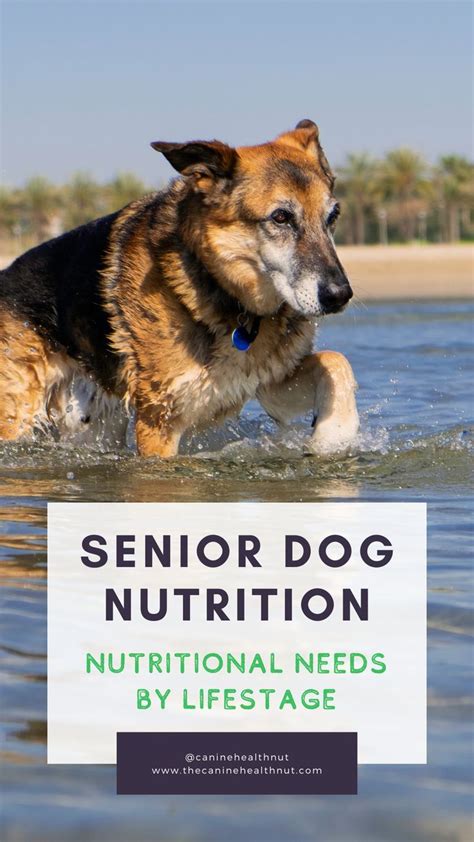As your beloved canine companion enters its golden years, their nutritional needs undergo a significant transformation. Senior dogs face unique health challenges and require a diet tailored to their changing requirements. This comprehensive guide will empower you with the knowledge to make informed decisions about your senior dog’s diet, ensuring their well-being and longevity.

The Challenges of Aging
The aging process in dogs is accompanied by several physiological changes that impact their nutritional needs.
- Reduced Metabolism: Senior dogs experience a decline in their metabolism, resulting in a decreased need for calories.
- Dental Problems: Teeth and gum issues become more prevalent with age, making it harder for dogs to chew and digest their food.
- Weight Gain: Decreased activity levels and reduced metabolism can lead to weight gain if not managed properly.
- Cognitive Decline: Some senior dogs may develop age-related cognitive disorders, affecting their eating habits and preferences.
- Joint Pain: Arthritis and other joint issues can make it painful for senior dogs to move around, which may reduce their appetite.
Essential Nutrients for Senior Dogs
Despite these challenges, senior dogs still require a balanced diet to maintain their health and vitality. Here are the key nutrients they need:
| Nutrient | Importance |
|---|---|
| Protein | Supports muscle mass and lean body weight |
| Fat | Provides energy and supports skin and coat health |
| Carbohydrates | Offer a source of slow-releasing energy |
| Fiber | Aids digestion and promotes satiety |
| Vitamins | Essential for a wide range of bodily functions |
| Minerals | Regulate fluid balance and support bone health |
Considerations for Senior Dog Food
When choosing the best food for your senior dog, consider the following factors:
- Calories: Opt for a formula with fewer calories to prevent weight gain.
- Digestibility: Senior dogs with dental issues may require a soft or wet food that is easy to chew.
- Joint Support: Look for foods containing glucosamine and chondroitin, which can support joint health.
- Cognitive Enhancement: Some foods contain omega-3 fatty acids and antioxidants that can help preserve cognitive function.
- Appetite Enhancers: Senior dogs with reduced appetite may benefit from foods with added flavors or palatability enhancers.
Recommended Feeding Schedule
The ideal feeding schedule for senior dogs depends on their individual needs. Generally, most senior dogs require two to three meals a day, spread evenly throughout the day. Smaller, more frequent meals can help prevent bloat and digestive upset.
Watching for Signs of Malnutrition
It is crucial to monitor your senior dog for any signs of malnutrition, which may include:
- Weight loss or gain
- Poor appetite
- Dull coat
- Lethargy
- Diarrhea or vomiting
- Skin problems
Common Health Issues in Senior Dogs
Several health conditions are common in senior dogs, and their diet can impact their severity.
- Cardiovascular Disease: Dogs with heart problems may need a low-sodium diet to reduce fluid retention.
- Kidney Disease: Senior dogs with kidney disease require a diet low in phosphorus and protein.
- Liver Disease: Dogs with liver disease may benefit from a diet high in protein and low in copper.
- Diabetes: Senior dogs with diabetes need a controlled diet that prevents blood sugar spikes.
The Future of Senior Dog Nutrition
Ongoing research and advancements in pet nutrition are continuously improving the options available for senior dogs. Some emerging trends include:
- Personalized nutrition tailored to the individual needs of each dog.
- Functional foods that provide additional health benefits beyond basic nutrition.
- Smart feeders that monitor food intake and provide alerts in case of changes in eating habits.
FAQs
1. What is the best way to introduce new food to my senior dog?
Start by mixing a small amount of the new food with their current food. Gradually increase the amount over a few days until they are fully transitioned to the new formula.
2. Can I feed my senior dog table scraps?
While occasional table scraps are unlikely to harm your dog, it is not recommended to make it a regular part of their diet. Table food is often high in fat and calories, which can contribute to weight gain and other health issues.
3. What should I do if my senior dog has lost its appetite?
Contact your veterinarian as soon as possible. Reduced appetite can be a sign of several underlying health problems.
4. How can I prevent weight gain in my senior dog?
Monitor your dog’s weight regularly. Adjust their calorie intake as needed based on their activity level and any changes in their weight.
5. What type of supplements might benefit my senior dog?
Consult your veterinarian before giving your dog any supplements. They can recommend supplements that are appropriate for your dog’s individual needs, such as glucosamine for joint support or omega-3 fatty acids for cognitive health.
6. Should I feed my senior dog according to their ideal weight or their current weight?
If your senior dog is overweight, aim to feed them according to their ideal weight. This will help them lose weight and reduce the risk of related health problems.
7. What are some warning signs of dental problems in senior dogs?
Bad breath, bleeding gums, difficulty chewing, and excessive drooling are all potential signs of dental issues. Regular dental checkups are crucial to maintaining your dog’s oral health.
8. How can I make mealtime more enjoyable for my senior dog?
Add warm water or low-sodium broth to your dog’s food to make it more flavorful and easier to chew. You can also try feeding your dog in a quiet, comfortable location where they can relax and enjoy their meal without distractions.





















